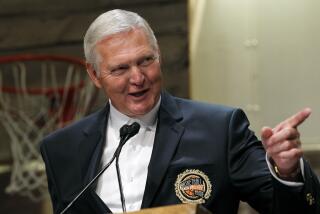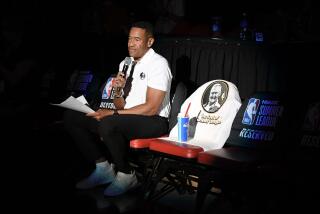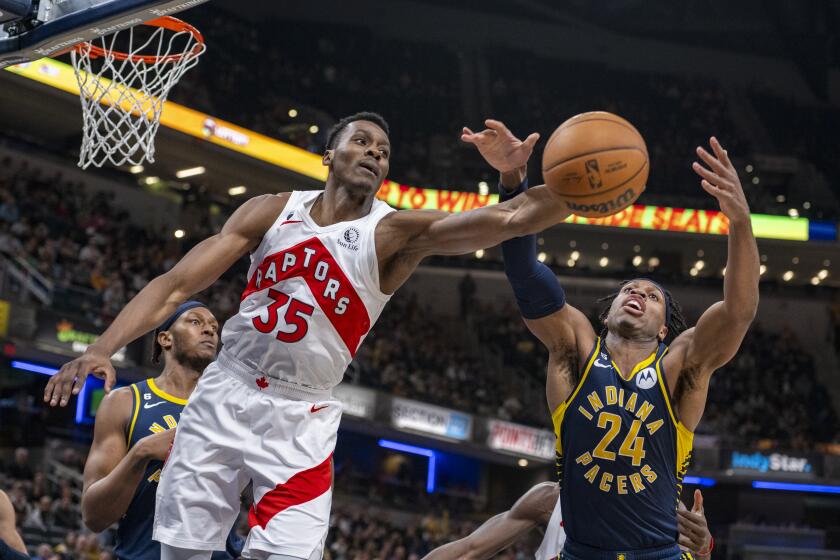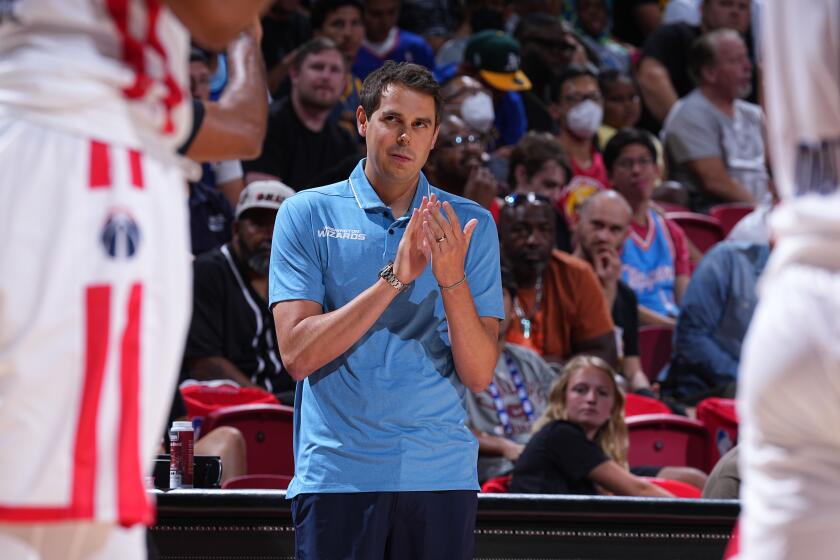Jerry Buss’ everlasting purple and bold effect
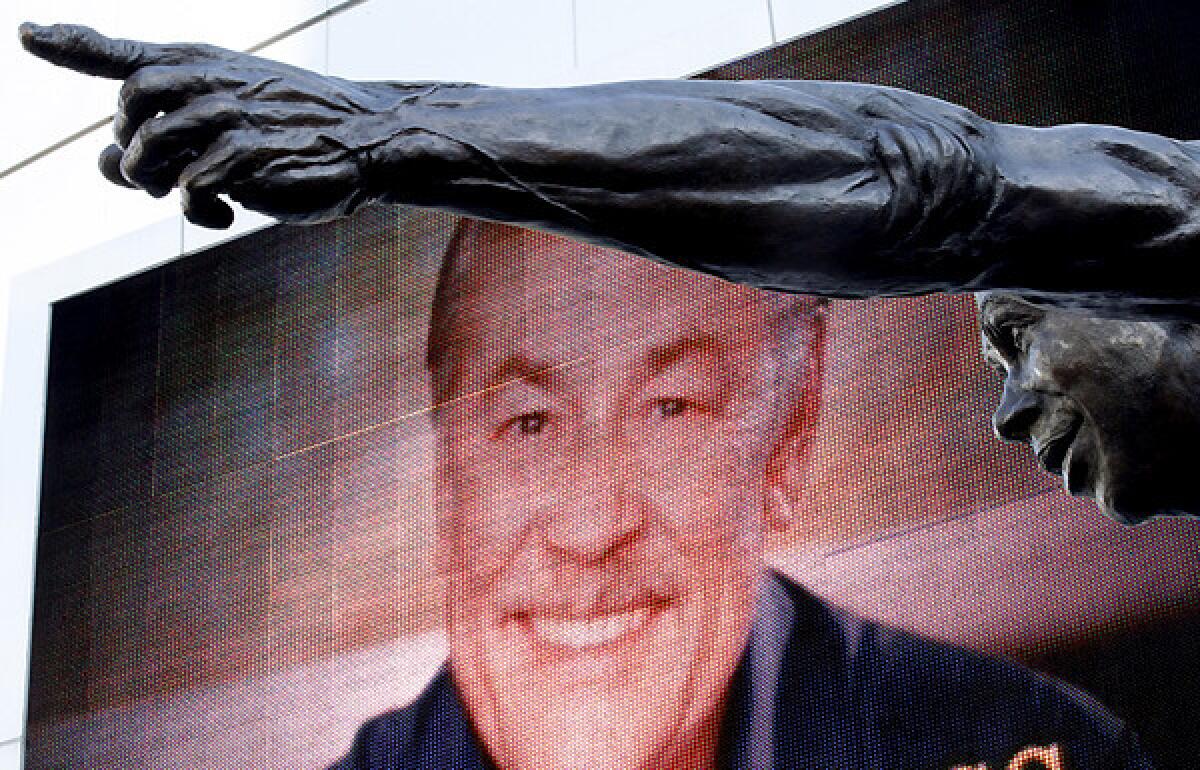
Jerry Buss may be gone, but Jerry Buss hasn’t gone anywhere.
Jerry Buss may have died on Feb. 18 at age 80, but Jerry Buss lives.
When watching the Lakers makes you howl, when watching the NBA makes you smile, when watching anything in professional sports makes you tap your toe, Jerry Buss is there.
“He was nothing less than a transformational force in the history of sports,” said NBA Commissioner David Stern at Buss’ memorial service.
Forever and ever, amen.
When you are cheering the Laker Girls, you are cheering Jerry Buss. He invented them, he promoted them, he inspired not only their skimpy clothes and gyrating dances but also their community outreach and public service. He made them the centerpiece of his newfangled idea to turn sports into entertainment. And, OK, to be honest, he probably dated a few of them.
When you are walking inside Staples Center, you are walking inside a monument to Jerry Buss. Does anybody really think that real estate billionaire Phil Anschutz would have built this country’s most glamorous sports palace without knowing he had a tenant who could come and rock it? Is it any wonder that one of Anschutz’s first phone calls was to Buss, who picked up the phone and said, sure, we could always use a bigger dance hall, bring it on! Forget the Kings, forget the Grammy Awards, even forget the Celine Dion concerts, there would be no Staples Center without the powerful attraction of Jerry Buss and his Lakers.
When you feel the inspiration of Magic Johnson, you feel the inspiration of Jerry Buss. This country’s most influential sports figure — who has made a bigger impact in retirement? — would never have thrived without Buss. When Johnson says, “I was Dr. Buss’ black son,” he means it. Buss picked Johnson as his first young star. Buss gave Johnson the freedom to become Magic. Buss gave Johnson the strength to become human and acknowledge he had HIV. Buss handed Johnson $14 million during a season in which Johnson retired before the first game. Buss taught Johnson the economic skills to become one of this country’s most inspirational businessmen after retirement. The only person to consistently weep during interviews about Buss’ death was Johnson, and there was nothing magic about it.
When you hear the recorded tones of Chick Hearn, you hear Jerry Buss. Only under such a loyal boss could an announcer endure so long while becoming a treasure to so many. As the television and radio voice of the Lakers, Hearn broadcast 3,338 consecutive games in a streak that lasted 36 years. Many of those nights he was tired or sick, and many bosses would have made their employees stay home, but Buss never really made his employees do anything. He gave them their assignments and stayed out of the way. Only through this constant support could Hearn become a legend whose statue stands outside Staples Center among sporting greats. Actually, the statue doesn’t stand, it’s of Hearn sitting in press row, because that’s where Buss insisted he remain for as long as he lived.
When you gawk at Jack Nicholson sitting courtside, you are gawking at Jerry Buss. It is a myth that Nicholson became perhaps the most famous single fan in all of sports because he loves the Lakers. He became that sort of fan because Buss supported and encouraged his love for the Lakers. What, you think Nicholson always paid for his courtside seats? The Lakers comped him plenty to keep him there, and ordered the cameras turned on him for years before he reached his basketball-cult-star status. Buss understood that having the entertainment stars surround his basketball stars put the Lakers smack in the middle of Hollywood. One of the saddest parts of Buss’ memorial service was Nicholson’s refusal to speak there, just days before he was a presenter at the Academy Awards. Buss spent so many years cheering for Jack, it would have been nice to see Jack cheering for Buss.
Finally, when you are frustrated at the discord between the two main heirs to Buss’ Lakers throne — daughter Jeanie and and son Jim Buss — you are actually embracing the very essence of Jerry Buss. He may have been a playboy, but he was also a loving father, which could both help and hurt the Lakers in the future. He empowered Jeanie to become one of this country’s top female sports executives by putting her in charge of the Lakers’ business operations. He has attempted to do the same thing with Jim by putting him in charge of basketball. What worked so well for Jeanie hasn’t worked so well for Jim, and Lakers fans can only hope that in the inevitable power struggle, Jeanie wins and controls her father’s empire.
Make no mistake, Jerry Buss left an empire. It is one built on equal parts competitiveness and entertainment. It is one that cares equally about victories and fans. It is one that has affected other sports empires throughout the country, including the Dallas Cowboys and New York Yankees. But mostly, it is an empire that changed a city, the Lakers connecting with their fans like perhaps no other team in any other community.
When you hear the words to the Lakers’ victory song, you will forever feel the message of Jerry Buss. He loved L.A. He loved it.
twitter.com/billplaschke
More to Read
All things Lakers, all the time.
Get all the Lakers news you need in Dan Woike's weekly newsletter.
You may occasionally receive promotional content from the Los Angeles Times.

